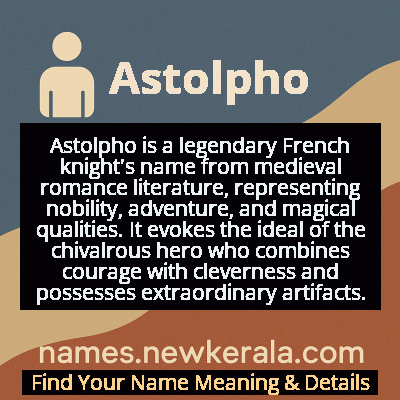Astolpho Name Meaning & Details
Origin, Popularity, Numerology Analysis & Name Meaning of Astolpho
Discover the origin, meaning, and cultural significance of the name ASTOLPHO. Delve into its historical roots and explore the lasting impact it has had on communities and traditions.
Name
Astolpho
Gender
Male
Origin
French
Lucky Number
7
Meaning of the Name - Astolpho
Astolpho is a legendary French knight's name from medieval romance literature, representing nobility, adventure, and magical qualities. It evokes the ideal of the chivalrous hero who combines courage with cleverness and possesses extraordinary artifacts.
Astolpho - Complete Numerology Analysis
Your Numerology Number
Based on Pythagorean Numerology System
Ruling Planet
Neptune (Ketu)
Positive Nature
Intuitive, analytical, spiritual, and inquisitive.
Negative Traits
Secretive, reserved, aloof, and can be overly critical.
Lucky Colours
Green, yellow.
Lucky Days
Monday.
Lucky Stones
Cat’s eye, moonstone.
Harmony Numbers
1, 5, 6.
Best Suited Professions
Scientists, researchers, spiritual leaders, detectives.
What People Like About You
Depth of knowledge, analytical skills, spirituality.
Famous People Named Astolpho
Astolpho
Legendary Knight
Charlemagne's paladin known for magical horn and adventures in French epic poetry
Astolfo
Literary Character
Central figure in Ariosto's Orlando Furioso who recovers lost wits from the moon
Astolpho de la Cueva
Spanish Noble
16th century military officer documented in Spanish colonial archives
Name Variations & International Equivalents
Click on blue names to explore their detailed meanings. Gray names with will be available soon.
Cultural & Historical Significance
The name's cultural significance expanded dramatically during the Renaissance through Ludovico Ariosto's masterpiece 'Orlando Furioso', where Astolfo becomes one of the poem's most memorable characters. His journey to the moon to recover Orlando's lost sanity transformed him into a symbol of reason, exploration, and the humanist ideal that intellect could conquer even madness. This literary evolution made Astolpho a representative figure of the transition from medieval to Renaissance thinking, where classical learning and human reason were valued alongside traditional chivalric virtues. The name thus carries layers of cultural meaning from both French epic tradition and Italian humanist literature.
Extended Personality Analysis
Those bearing the name Astolpho typically exhibit a personality marked by adventurousness, intellectual curiosity, and a charming, sometimes flamboyant demeanor. They are natural explorers who thrive on new experiences and challenges, displaying remarkable adaptability and resourcefulness in unfamiliar situations. Like their legendary counterpart, they tend to approach problems with creativity and wit rather than brute force, often finding unconventional solutions that others might overlook. Their charismatic nature makes them effective leaders and compelling storytellers, capable of inspiring others with their vision and enthusiasm.
Beneath their sometimes boastful exterior lies genuine competence and reliability, making them trusted companions in difficult circumstances. They possess a unique blend of courage and humor that allows them to face challenges without losing perspective or becoming overly serious. This balance between noble purpose and human imperfection makes them both admirable and approachable figures. Their personality reflects the romantic ideal of the questing knight—driven by high ideals but grounded in practical intelligence and emotional resilience, creating individuals who can navigate both epic challenges and everyday life with equal grace.
Modern Usage & Popularity
In contemporary naming practices, Astolpho remains an extraordinarily rare choice, primarily selected by parents with strong interests in medieval literature, French history, or unique mythological names. Its usage is almost exclusively limited to France and Italy, where it maintains faint connections to cultural heritage, though even in these countries it appears very infrequently. The name has experienced minor visibility through popular culture, particularly in the anime and gaming communities where the character Astolfo from Fate/Grand Order has developed a dedicated following. However, this has not translated into significant adoption as a given name. Astolpho's extreme rarity makes it a statement choice that signals literary sophistication and a rejection of conventional naming trends, appealing to parents seeking a name with historical depth and distinctive character rather than contemporary popularity.
Symbolic & Spiritual Meanings
The name Astolpho carries rich symbolic meaning derived from its literary heritage, primarily representing the quest for enlightenment and the restoration of reason. His most famous adventure—journeying to the moon to recover lost wits—makes the name emblematic of the human pursuit of wisdom and mental clarity through extraordinary effort. It symbolizes the idea that true understanding often requires venturing beyond conventional boundaries and perspectives. The character's possession of magical artifacts, particularly his horn that could rout armies and his book that broke enchantments, symbolizes how specialized knowledge and unique talents can overcome seemingly insurmountable obstacles.
Additionally, Astolpho represents the balance between noble purpose and human imperfection, embodying the concept that heroism includes both grand achievements and relatable flaws. His occasional boastfulness and comedic moments symbolize that true courage doesn't require perfection but rather persistence and adaptability. The name thus serves as a metaphor for the human condition itself—the ongoing journey toward self-improvement and understanding, aided by both innate abilities and acquired wisdom, while maintaining humor and perspective throughout life's challenges.

